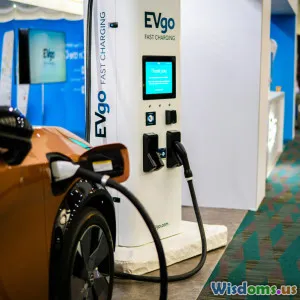
Revolutionizing Recycling with Technology
5 min read Explore how innovative technologies are transforming recycling processes, enhancing efficiency, and promoting sustainability. (0 Reviews)
Revolutionizing Recycling with Technology
Recycling is a crucial component of sustainable living and environmental conservation. As our world grapples with escalating waste production and resource depletion, the need for efficient recycling practices has never been clearer. Fortunately, technology is stepping up to revolutionize how we recycle. This article explores the innovative technologies that are transforming recycling processes, enhancing efficiency, and promoting sustainability.
The Current State of Recycling
Before diving into the technological advancements, it’s essential to understand the current recycling landscape. According to the Environmental Protection Agency (EPA), only about 35% of the total waste generated in the United States was recycled or composted in 2020. The challenges include contamination of recyclables, inefficient sorting methods, and a lack of public awareness. As a result, a significant portion of recyclable materials ends up in landfills, contributing to environmental degradation.
How Technology is Changing the Game
1. Artificial Intelligence (AI) and Machine Learning
AI has emerged as a game-changer in recycling. Machine learning algorithms can analyze vast amounts of data to improve sorting processes. For instance, companies like ZenRobotics have developed robotic systems that utilize AI to identify and sort different types of materials on recycling lines. These robots can work faster and more accurately than human workers, significantly reducing contamination rates and increasing the volume of materials processed.
2. Internet of Things (IoT)
The integration of IoT technology into recycling systems is enhancing efficiency in waste management. Smart bins equipped with sensors can monitor fill levels and send alerts when they need to be emptied. This prevents overflowing bins and ensures timely collection. Bigbelly, for example, has created solar-powered smart waste and recycling bins that offer real-time tracking and data analytics to optimize waste collection routes, saving fuel and reducing carbon emissions.
3. Blockchain Technology
Blockchain technology is making waves beyond cryptocurrencies, particularly in recycling. It offers transparency and traceability in the recycling supply chain. By utilizing blockchain, companies can track materials from the point of collection to processing, ensuring that they are handled responsibly. This technology can help combat fraud and ensure that recyclables are genuinely being processed rather than being sent to landfills, as highlighted by initiatives like Everledger.
4. Advanced Material Recovery Facilities (MRFs)
Modern Material Recovery Facilities are utilizing advanced technologies such as optical sensors and conveyor systems to enhance sorting capabilities. These facilities can automatically sort mixed recyclables with high precision, separating materials like plastics, metals, and paper more effectively. This technological improvement allows for higher-quality recyclables that can be sold at better prices, thus incentivizing recycling efforts.
5. Mobile Applications and Gamification
Engaging the public in recycling efforts is crucial for success. Mobile applications that gamify recycling practices are becoming popular. Apps like Recyclebank reward users for recycling correctly and participating in sustainable activities. These platforms not only educate users on recycling but also foster a community of environmentally conscious individuals committed to reducing waste.
Challenges Ahead
Despite the promising advancements, several challenges remain. The initial investment in technology can be significant, and not all municipalities have the budget to implement these systems. Additionally, public education on proper recycling practices is essential to ensure that technology is utilized effectively.
Conclusion
Technology is undeniably revolutionizing recycling, making it more efficient, transparent, and engaging. As we continue to develop and adopt these innovations, we move closer to a sustainable future where recycling plays a pivotal role in resource management. By embracing these advancements, we can significantly reduce waste, conserve resources, and protect our environment for generations to come. It’s time to harness the power of technology to transform recycling and create a cleaner, greener planet.
Rate the Post
User Reviews
Popular Posts





















